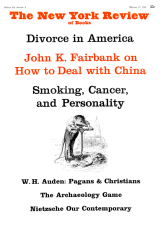In response to:
Just Friends from the January 6, 1966 issue
To the Editors:
Rarely have I read such a stimulating issue of The New York Review of Books (Jan. 6): Gombrich on Greek art, Hardwick on theater in New York, Eleanor Clark on Edith Wharton, Hans Morgenthau on Kennedy books, etc. But what touched me most closely was John Weightman’s review of Claude Mauriac’s Conversations with André Gide, possibly because I have already reviewed that book for another periodical. Unfortunately I could not say what Mr. Weightman said at the outset about the translation by one of my former students, but he is altogether correct and his pastiche is delightful. Someone should stop Lebeck now; possibly this will do it.
Everything Mr. Weightman says about the book and about Gide delights this gidisant except for his remarks about Gide’s sexual relations with women. There I believe he is indulging in the kind of “psychologizing” that we once associated with semispurious M.D.S. who dabbled on the confines between literature and psychiatry. Mr. Weightman states: “It seems incredible that any man, and more especially a Frenchman, should be so ignorant of female sexuality, particularly when he had had mistresses and had even fathered the child of another woman.” Now, he knows as well as anyone—for is he not “Reader in French at the University of London”—that André Gide never had a mistress; an occasional encounter with the dark-skinned Meriem or En-Barka in the early Nineties at Biskra does not make of either a mistress. Again he states: “How or why he eventually had a child with a woman about whom there is little or nothing of relevance in his diaries has never been revealed, although contradictory anecdotes have circulated from time to time.” I should have thought that Mr. Weightman was more of a scholar than to pay attention to anecdotes; hasn’t he read my Portrait of André Gide? After all, a proper Englishman should not expect details about such matters. Why doesn’t he read Gide’s trilogy of L’Ecole des femmes and indulge in the kind of guessing that regularly goes on behind the curtains of Brompton Road? Then he continues in his boyish way to base assumptions on the most revealing book by Jean Delay, which the author calls a “psycho-biography,” but he stops short of Delay’s conclusions in order to make them himself without the authority of the M.D. who heads the psychiatric section of the University of Paris Medical School.
But in writing book reviews we all get out bits and pieces where we can; I can understand and forgive Mr. Weightman. Different as my review of Claude Mauriac was, I greatly enjoyed his, despite that obsessive trout.
Justin O’Brien
Canterbury, Connecticut
This Issue
February 17, 1966



